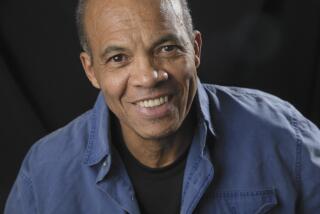‘SALVADOR’ HAS ACTION AS LOUD AS ITS WORDS
Whatever may be flawed in Oliver Stone’s searing, full-torque new war movie “Salvador” (Friday at the Mann Regent), one thing about it is burningly right: It’s alive. It broils, snaps and explodes with energy. The events (condensed from two years of battles and political upheaval in El Salvador) fly past at a murderous clip, hurtling you along almost demonically.
Everything is inflated, seething with conflict. Killers crawl over the landscape like scorpions on a stove. When a battle erupts, it seems a logical climax for the crazy, tense, superheated atmosphere: mad characters floating along on a sea of booze, sex and paranoia, watching a country die around them.
The movie is based on the El Salvador experiences of combat photojournalist Richard Boyle, who co-wrote the script with Stone. Boyle depicts himself--and James Woods plays him--as a paragon of sleazy outlaw journalism. He’s a yuppie-hating con man shamelessly using everyone around him, alternately obsequious and vitriolic, living defiantly on the edge. When Boyle flees to El Salvador (with Jim Belushi as his bellicose disc-jockey buddy, Dr. Rock), he seems less shining idealist than news bum making tracks. Woods is great in this part: It’s his nerviest, tightest, gutsiest performance. His Boyle is Gonzo personified. In fact, if any movie ever caught the whole weird, racing, arcing mind-set of Hunter Thompson’s reportage, it’s this one.
“Salvador” is packed with historical incident and thinly disguised characters and events. Sometimes, it’s constructed like a “Z”-style agitprop melodrama. Boyle and Stone obviously want you to share their outrage at what they see as the brutality of the death squads, the corruption of the government, and the hypocrisy of U.S. foreign and immigration policy. But you don’t have to accept all their arguments to be impressed by this movie. This may be the rare political thriller where the psychology moves you as much as the history.
In a way, “Salvador” is closer to “Casablanca” than to Costa-Gavras. It’s a left-wing romance on a topical subject, a tale of a cynic redeemed. It might be better, actually, if Stone and Boyle didn’t pour on that redemption, trying to make Boyle some universal witness to the suffering of El Salvador.
The movie goes bad briefly when Stone lets wafer-thin clouds of sentimentality deodorize the bracing cynicism and viciousness. It’s as if Stone felt he had to pay for his audacity: sing a few hymns about brave, simple fighters of the soil. It’s not really in him, and he’s also weak on sexual relationships. (The women in “Salvador” get idealized too--perhaps their compensation for dealing with men as wily, foul-mouthed and irresponsible as the “heroes” here). The only female here that really affects you is the one Stone hates: Valerie Wildman as a promiscuous TV reporter.
But Stone is superb at showing the grungy depths of male camaraderie. He gets the rhythms, the profanity, the whiplash irreverence of professionals strung out to the limit. He writes and stages some of the best temper tantrums ever. Like Nicholson or De Niro, Woods turns these into arias.
A decorated Vietnam combat veteran, Stone seems to feel that war is a pathological subject, painting most of the participants as near psychopaths (which is why the rebels’ romanticization rings false). As a screenwriter (“Midnight Express,” “Scarface”), Stone has always been best at the ambiance of corruption and at bloody, primal battles. He has an eye for savagery: losers and damned souls struggling on the spit. As a director, he shows surprising gifts: immediacy, boldness, tight ensemble work. He keeps jolting you--making crescendos of violence, crackling volts of invective--and Georges Delerue’s atypically taut, dissonant score beats hotly underneath it.
“Salvador” can’t help stir up controversy--though Stone has been more scrupulous about his facts (and fictions) than many topical thrillers. “Salvador” (rated R) is violent, gutsy, brainy, occasionally annoying and hellishly exciting: a “man’s movie” of a kind you rarely see. It’s a film that sings and screams: No one will go away from it unprovoked or unmoved.
‘SALVADOR’ A Hemdale Film Corp. release. Producers Gerald Green, Oliver Stone. Director Stone. Script Richard Boyle, Stone. Camera Robert Richardson. Editor Claire Simpson. Music Georges Delerue. With James Woods, James Belushi, Michael Murphy, Elpedia Carrillo, John Savage, Tony Plana, Cynthia Gibb, Jorge Luke.
Running time: 2 hours, 3 minutes.
MPAA rating: R (under 17 requires an accompanying parent or adult guardian).
More to Read
Only good movies
Get the Indie Focus newsletter, Mark Olsen's weekly guide to the world of cinema.
You may occasionally receive promotional content from the Los Angeles Times.










